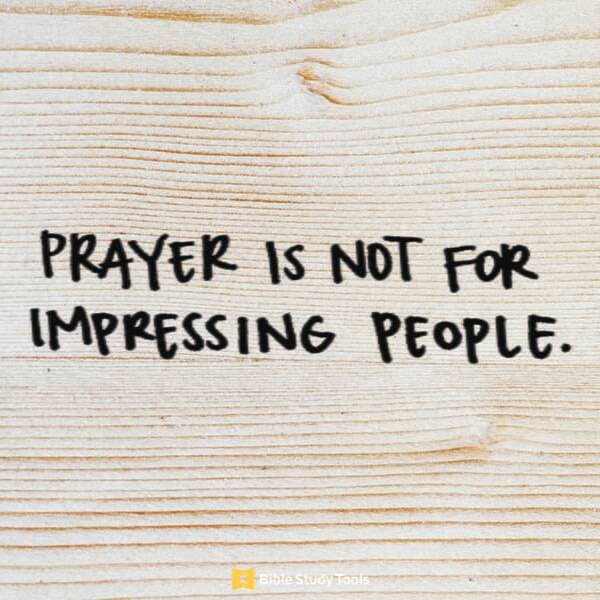Jesus is so concerned about the heart of the person who prays that he precedes His teaching on prayer with a warning against pretending to be righteous.
Matthew 6:1-4 (NLT2)1 “Watch out! Don’t do your good deeds publicly, to be admired by others, for you will lose the reward from your Father in heaven.2 When you give to someone in need, don’t do as the hypocrites do—blowing trumpets in the synagogues and streets to call attention to their acts of charity! I tell you the truth, they have received all the reward they will ever get.
3 But when you give to someone in need, don’t let your left hand know what your right hand is doing.4 Give your gifts in private, and your Father, who sees everything, will reward you.
Many people think that the purpose of prayer is to get our will done and to persuade God to give us what we want. The true purpose of prayer is to get God's will done when we ask according to His will
1 John 5:14-15 ESV And this is the confidence that we have toward him, that if we ask anything according to his will he hears us. And if we know that he hears us in whatever we ask, we know that we have the requests that we have asked of him.
The one word for this clear and present danger that every follower of Christ faces is – hypocrisy. And hypocrisy is, in essence, about making the approval and praise of man our top priority.
Jesus’s warning about hypocrisy is this: What you seek is what you get. Whether it is in praying, fasting, or giving, if your motive is about getting the attention and praise of men, well, you will get that. Nothing more. Certainly not the attention and reward of God. And you shouldn’t be surprised; for you were not seeking the attention or the reward of God. What you seek is what you get.
Michelle Lazurek
1. You pray to make others think you are more spiritual than you are.
Pharisees love to look good to others, especially in public. If you are in a situation where you need to pray, do you find yourself adding in religious jargon to make it seem as though you are closer to God than you are?
God desires His children’s fellowship —the real us. When we pray, don’t worry about using the right language or sounding more spiritual. Sometimes the best prayers come from us who are willing to take off the mask and be real.
2. You pray only for yourself and not for others.
The Pharisees were often concerned with
telling people what to do, but rarely did they actually care for others and help them in tangible ways. When we pray, it is important not only to pray for our own needs, but also for the needs of others. Jesus loved people enough to give His life for them; we should do so in every aspect of our lives including our prayer lives.
Take a moment to analyze your heart. Do you love the poor? The sick? The people who don’t think, act, and sound the way you do? Set a goal when you pray to spend half of your prayer time praying for others. This will make a world of difference as you realize how much of a Kingdom impact we can truly make if we set our eyes on helping others rather than only ourselves.
3. You pray because you think you are more spiritual than others.
In the same way as you may pray to make yourself sound more spiritual, you may pray a certain way because you think you are more spiritual than others.
In this world full of information technology, it's easy to fill our heads full of knowledge.
Consider 1 Corinthians 8:1 – "We know that 'We all possess knowledge.' But knowledge puffs up while love builds up."
If the Pharisees had as much love as they had knowledge, their influence on society could have been an entirely different story. If we as Christians focused more time on loving others and less time educating them on theology, how much would our impact on society change? Fellowship and application of the Bible is what we need to do to grow in the Lord.
As Christians, it is our job to shepherd others along in the process of making disciples.

The Pharisees were so preoccupied with what others thought of them that they always prayed in public for one reason—to impress the masses. For them, the more people followed them and heeded their wisdom the better off they thought they were doing.
This is why when Jesus came onto the scene, they couldn‘t stand him. Jesus was the real deal. He had a genuine relationship with God, and He wasn’t afraid to call them out on their sin. He exposed their fake personas much to their chagrin—and ultimately fueled their taste for revenge.
When you pray, do you use your prayers to manipulate and control people for the ultimate goal that they will be impressed with you? Do you take a silent inventory of how many people are listening to your prayers because you care about how many are impressed with your words rather than your genuine care for them?
Jesus loved people so much he spent the majority of his time healing them, releasing them from bondage, and driving out demons. Do we pray with little concern about helping their tangible needs and more concern about how many people are clapping their hands at the sound of your prayers?
5. You use your prayers to gossip about them rather than to love them.
Ephesians 4:29 says, “Do not let any unwholesome talk come out of your mouths, but only what is helpful for building others up according to their needs, that it may benefit those who listen.” Although we may genuinely want to show concern for our brothers and sisters in Christ, the first words out of our mouths should not be “pray for so and so, they are struggling in their marriage,” unless they have given us permission to do so. Otherwise, it is gossip.
When prayer would be meant for good, our use of it to gossip or slander our neighbor is a way to pray like a Pharisee. Luke 18:11-12 says, “The Pharisee stood by himself and prayed: ‘God, I thank you that I am not like other people—robbers, evildoers, adulterers—or even like this tax collector. I fast twice a week and give a tenth of all I get.’”
The Pharisees loved to puff themselves up by putting others down. As they gossiped about all those other people, their reputation as being unloving increased. As Christians, our public prayers should be about exalting God, not ourselves.
6. You use your prayers to be hypocritical.
To be a hypocrite means to pretend to be one way, while your actions prove otherwise. The world already thinks Christians are hypocrites—we don’t need to use our prayer time to prove them right.
When you are praying for world peace and other plights of our nation without caring much about the tangible ways in which you can change our world, that is the epitome of hypocrisy.
Don’t open your mouth to pray about anything you don’t genuinely care about. The world will know what we care about from where we spend the majority of our time.
If we don’t allocate our time, money, and other resources to the things that God wants to change in our world, how dare we complain when our rights to be Christians get silenced?
7. You use your prayers to flaunt your agenda.
At a public prayer meeting, the pastors from various congregations gathered in a public square to pray for our country. Although initially done with the objective of unity, it turned out to be more divisive than unifying. Each pastor got to the microphone and used their prayers to degrade other pastors present for their theological and political views.
When a bunch of pastors left out of anger, it was easy to see the pastors used their platforms to tear down rather than build up.
Prayer should not be used as a megaphone for any agenda—political or otherwise. Jesus used his prayers to commune with his father or to give glory to him. He never used it to raise himself up, but only to point people to God. We should do the same.
Prayer can be one of our most powerful weapons not only to commune with our heavenly Father, but also to approach the throne of God with the cares of our souls. But when we use it to exalt ourselves, impress others, or to show how we're 'more spiritual' than others, we tarnish God’s—and our—reputation.
The best way we can shed a Pharisaical attitude is to be genuine and authentic in our relationship with God. When we pray with humility and care for others, we become less like Pharisees and more like the body of Christ.

 RSS Feed
RSS Feed